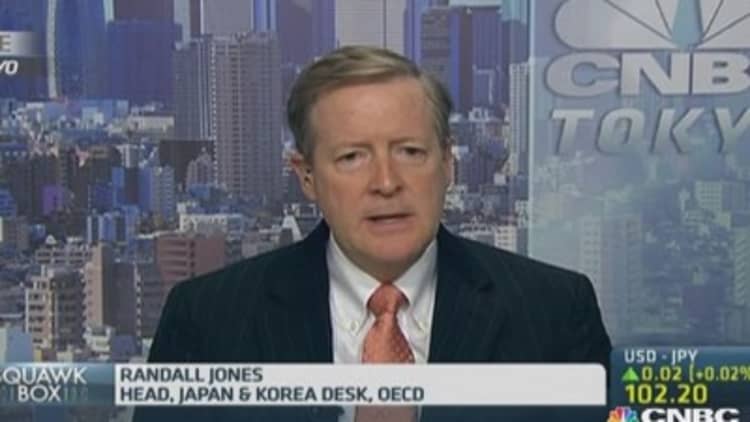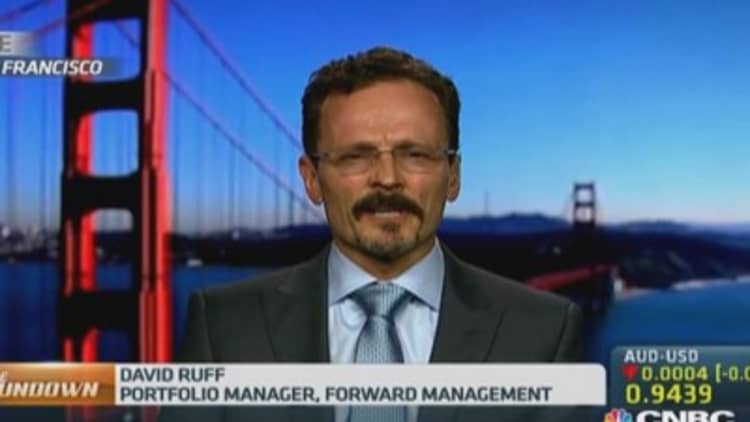First there was Japan's Abenomics, then Modinomics of India. Now South Korea has coined its own package of economic policies, which economists say will lead to a period of "big bang expansionary growth."
Dubbed 'Choinomics' after newly-appointed finance minister Choi Kyung-hwan, the term describes Choi's policies to revitalize South Korea's economy after the government unleashed a $39 billion fiscal stimulus package, equivalent to nearly 3 percent of the country's gross domestic product, last week.
South Korea - Asia's fourth-largest economy - has been grappling with massive household debt levels and a weak property market. Home prices have fallen for six out of the past seven years and dropped 0.5 percent during the first half of 2014, according to top mortgage lender Kookmin Bank.
Read MoreS.Korea Q2growth at slowest in more than a year
In a speech on Monday, Choi said the government and the central bank are on the same page in their assessment of the country's economy - where growth slowed to its weakest pace in more than a year in the second quarter - raising the possibility the Bank of Korea may lower interest rates soon.
The central bank maintained rates at 2.5 percent for a 13th straight month in June.

"The rise of 'Choinomics' has apparently become a political reality. We think that Choi has conveyed a message that [Bank of Korea] governor Lee is mulling a big bang expansionary policy," said Australia New Zealand Banking (ANZ) economists Raymond Yeung and Louis Lam in a report.
Read MoreThis is big business in Korea (and it's not K-pop)
The stimulus package includes property-boosting measures such as a loosening of the loan-to-value and debt-to-income ratios for home buyers and increasing the loan amount eligible for borrowers.
"While these adjustments could add pressure on the mounting household debts, which has already reached 1,025 trillion won [$998 billion], they will help warm up the weak real estate market and improve household's credit quality," said ANZ.
Experts say what deserves the most attention are structural changes in the form of promised tax breaks for companies that gave workers high wage increases and heavier taxes on cash reserves at South Korean corporations.
"We really like that he wants to increase dividend payouts for corporations who are notorious for not paying out dividends," Michael Na, Korea strategist at Nomura, told CNBC.
Read MoreIn South Korea, you snooze, you don't lose!
"If Korean firms start paying out 50 percent of earnings, that would be 5.2 percent of dividend yield, which is very attractive for global income funds. That could spark a wave of buying and see the Kospi rise to 3,000" he continued. That would be a more than 40 percent increase from the benchmark index's current levels.

ANZ expects success with Choinomics, particularly in weakening the won, which has been trading at six-year highs against the dollar in recent months, and taken a toll on earnings of big exporters like Hyundai Motors and Samsung.
Is the package enough?
Investors may have cheered news of the stimulus package, sending the benchmark Kospi to fresh three-year highs in recent sessions, but not everyone is as optimistic.
Read MoreScenes from South Korea's ferry disaster
Analysts at Societe Generale think Choinomics will boost asset markets, not so much economic growth.
"The government's package for expansionary macroeconomic policy looks impressive at first glance, but its actual impact is likely to be fairly small. It consists of 11.7 trillion in quasi-fiscal measures and 29 trillion won of financial support from institutions such as the BOK and state-owned banks, which may not be effective in boosting GDP," the bank said in a note.
The tax benefits aimed at raising wages are also too small, and dividend payments won't make a dent in spending as they are not a major source of household income, Societe Generale added.
Read MoreJapan firms hurt byChina, South Korea tensions
Still, both ANZ and SocGen are both pricing in a 25 basis-point interest rate cut in August from the Bank of Korea.

